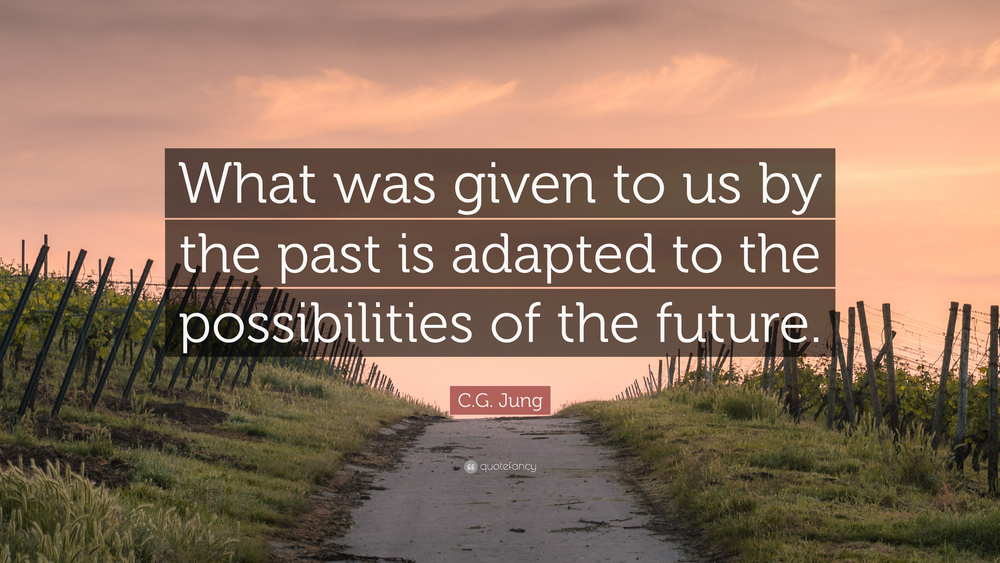
One of the biggest challenges for people in my Jungian analysis and counseling practice is letting go of a painful past. I see so many people stuck on rewinding and replaying the painful events of their lives. We get a few steps forward in the analytic process and then something pulls them back again.
This is the power that our past can have over us. The past is a potent force; and, it is a force with which we must reconcile again and again. The Yoga Sutras call this tendency of the ours, clinging to life by its own potency. In Jungian terms, we call it fixation. No matter what you call it, it’s an obstacle to moving forward in life.
In a conversation with Marie-Louise von Franz, Jung spoke about the power of the past. He said, “If one does not constantly walk forward, the past sucks one back. The past is like an enormous sucking wind that sucks one back all the time. If you don’t go forward you regress. You have constantly to carry the torch of the new light forward so to speak, historically and also in your own life. As soon as you begin to look backward sadly, or even scornfully, it has you again. The past is a tremendous power.”
So, let’s talk about the power of letting go.
 Now, I totally understand the grip a that a painful past can have over a person. I spent decades under the spell of my own personal history. So, I know from experience that letting go of the past is not easy.
Now, I totally understand the grip a that a painful past can have over a person. I spent decades under the spell of my own personal history. So, I know from experience that letting go of the past is not easy.
Your first step in letting go is to change the way you are responding to your past. For the moment, this means you have to remove from the equation, that bitter sense of injustice, immorality, or anything else that describes what happened.
I’m not going to talk to you about CBT or other behavioral modification techniques here. Those are very helpful for alleviating the symptoms of anxiety, depression, or rage that often come with a difficult past. I’ll be touching on that kind of stuff for sure – just not for now. Here I want to offer you a Jungian perspective on working with and transcending your painful past.
For me, the essence of transcending something doesn’t mean leaving it behind or getting over it. Transcending your painful past is about rising above your habitual response to it. Regardless of how justified your response may be.
Psychological transcendence is about getting a higher perspective on yourself as a human being who has suffered. And by higher I only mean rising up above it all and looking down it. From a higher perspective you can see your personal story as a whole life process.
The wise man … will ask himself: Who am I that all this should happen to me? To find the answer to this fateful question he will look into his own heart. Carl Jung
Before I studied Carl Jung’s psychology, I had contemplated various iterations of that question of his. I knew that my life experiences had meaning and that they were a part of what I used to call my Process. And I also knew that this process was somehow steered by something in me that was greater than my ego.
The problem was that I had no point of reference other than my own. And while I knew it to be Truth, self-doubt could still creep in. If I knew it to be Truth, then why could I still fall into states of hopelessness or despair? This puzzled me.
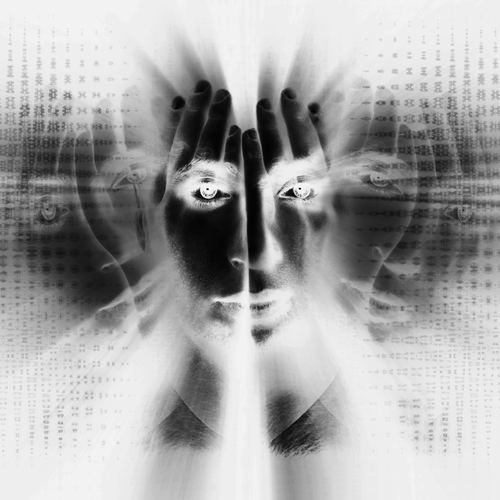 There was a war within me – a war between these two perspectives: this happened for greater purpose versus what happened was a brutal injustice.
There was a war within me – a war between these two perspectives: this happened for greater purpose versus what happened was a brutal injustice.
But when I saw that Jung had said it, I felt somehow validated. Here was a brilliant man who wrote enough volumes on psychology for 10 lifetimes saying the same thing I was. He called his process the individuation process.
I digressed just bit.
Table of Contents - Jump to Section
Back to learning to let go
Let’s get back to the question: In particular, I want to explore Jung’s question in that quote: Who am I that this should happen to me?
This question is not the same as the self-pitying, why me-syndrome that many people fall into. Don’t get me wrong here, some of us have to go through that stage before we can let it go. So many people have been injured to the point of feeling worthless and they need some honest sympathy.
But the problem is that too many people get stuck there.
Another problem is that many people hold on to their past like a crutch. Sometimes knowingly, and sometimes unknowingly, people use their terrible past as an excuse for their current state of hopelessness in life.
This is no course for future happiness, much less success. Clinging to the past in that way only traps you in the mindstate – in the expectation – that it should have been different for you.
… no matter how much parents and grandparents have sinned against the child, the man who is really adult will accept these sins as his own condition which has to be reckoned with. Only a fool is interested in other people’s guilt, since he cannot alter it. The wise man learns only from his own guilt. He will ask himself: Who am I that all this should happen to me? To find the answer to this fateful question he will look into his own heart.C.G. Jung
Like Jung said, it’s much easier to blame someone for your past, and thus your current state, than to take responsibility for how you respond to it. I think too many people believe, whether consciously or unconsciously, that taking responsibility for something painful means that whatever happened was okay. Or worse, that it was somehow their fault.
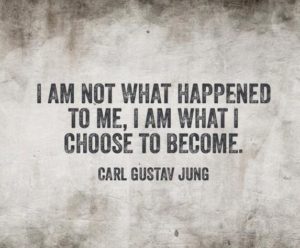 That’s not at all what letting go is about. Letting go of your past isn’t about forgetting it, or even forgiving it (though the latter has its psychological benefits). I think that letting go of the past is more about letting go of wishing it had been, or should have been, something else.
That’s not at all what letting go is about. Letting go of your past isn’t about forgetting it, or even forgiving it (though the latter has its psychological benefits). I think that letting go of the past is more about letting go of wishing it had been, or should have been, something else.
How to let go: the Perception Deception
This kind of thinking is what I call the Mother of all Deceptions. Especially when we get trapped in this concept of Should. Let me tell you, I rested in the arms of that dragon for a very long time. And it held me back from living. If I can help anyone else break through that deceptive trap, I will.
We are deceived into believing that the universe is not as it should be: believing things like our childhoods weren’t what they should have been; our relationships aren’t what they should be; or that the world is not what it should be.
Hence, we unconsciously resist life and become trapped in a dualistic measure, bound by the perceived fortunes and misfortunes of our limited ego. This kind of egoism causes us to suffer crisis —a confrontation with what is — manifested in our lives as the likes of confusion, depression, anxiety, and rage. We kill people over it. Wars are started because of it. All of it is bullshit. There is no such thing as should.
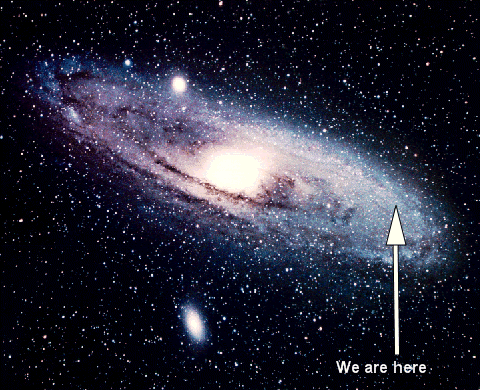 If I have learned one thing from my deepest moments of darkness and despair, it’s this:
If I have learned one thing from my deepest moments of darkness and despair, it’s this:
The universe is unfolding exactly as it “should be.” The universe is. We are not here to fix it. We have only to consciously align ourselves with it “as it is.” To believe anything else is to be trapped by something that you simply cannot control.
If we are to transcend that kind of limited thinking and connect to something deeper in ourselves, we have to stop believing and unconsciously engaging in ego-responses such as “this is right” and “this is wrong.” Instead, we must look at what is happening in terms of how a particular life experience transforms us. If we can see that everything that happens is part of our path, we can accept it and surrender to it.
… and after all my talk about letting go of the past – and now – back to my past
I want to return to my own past as a yoga teacher for a moment because it’s very close Jungian analytical psychology.
In the yogic way of thinking there are two concepts that I have tried to live by: acceptance and surrender. The Sanskrit word for acceptance is santosha. Santosha just means acceptance of the world “as it is”. This is not to suggest submission or resignation to anything external or “inevitable.” Nor is it to suggest that we have no power to change what can be, but rather to say that we be consciously present in the now, whether that now is a traffic jam, doing the dishes, or a life-changing tragedy.
The word for surrender is ishvarapranidhana. What we are surrendering is our self-limited perspectives. Surrender, however, is not about permanent dissolution of our self as an individual. All that we are surrendering are limited perceptions and egoistic determinations. Surrender is about expanding and deepening our self-concept through our conscious participation in life as it unfolds.
But first, to what are we surrendering? We are surrendering to life in whatever way it’s unfolding in the moment. That’s all we really have to work with. It’s so simple, yet so difficult. That’s the paradox.
This is not to say that any of the work you do is going to be easy. It’s certainly not. We still have to suffer through our sometimes very painful human experience. What I am saying is if you can translate these concepts into letting go of and working with your past, then you have the foundation and framework to survive anything life throws at you.
This kind of expanded vision frees us from the limited ego and its expectations and empowers us to transform ourselves through every experience. Facing life consciously under any circumstance: that is real freedom. To be liberated from our suffering, we have to be willing to give up everything – our past, our present, and our future – to our individuation process.
If we cannot psychologically surrender everything, then we are trapped. Whatever we refuse to surrender will keep us bound to it.
Once you can let go of that kind of limited thinking, then you’re ready for what I call, next level integration: changing your past.
People always say, “You can’t go back and change the past,” but this is not necessarily true. In a sense, you can change the past. And when you figure this out, everything about your present – and thus your future – changes also.
What I’ve been getting at this whole time is the absolute power of our perception. I have a whole story about how this revelation came to me. However, I fear that it would take this article beyond all endurance.
 Our perception is the lens through which we see the world. Our perception is the only place in our lives where we have absolute freedom. This freedom does not refer to anything other than the act of perceiving itself. Freedom is not about being able to have or be whatever we want. It is about trusting what we have and what we are – no matter what that is. How we live depends on how aware we are of this freedom. Our real freedom is the freedom of our awareness to perceive “what is” in our lives any way we want.
Our perception is the lens through which we see the world. Our perception is the only place in our lives where we have absolute freedom. This freedom does not refer to anything other than the act of perceiving itself. Freedom is not about being able to have or be whatever we want. It is about trusting what we have and what we are – no matter what that is. How we live depends on how aware we are of this freedom. Our real freedom is the freedom of our awareness to perceive “what is” in our lives any way we want.
 This is what Jung meant when he said that we must ask ourselves, “Who am I that all this should happen to me?”
This is what Jung meant when he said that we must ask ourselves, “Who am I that all this should happen to me?”
What do you choose to see?
Your past does not define you. How you respond to it defines you. “What was given to us by the past is adapted to the possibilities and demands of the future.” Whoever made that pretty quote of Jung’s left that last bit out. What he meant was too many people use their past to do nothing with their lives. Life demands that we participate and some people just say no, I can’t. I’m too injured.
This is a neurotic mechanism that must be stopped. If not, you’re going to fall into yourself and wake up day too old or broken to do anything about it. Don’t let that happen.
Letting go of your past: Conclusion
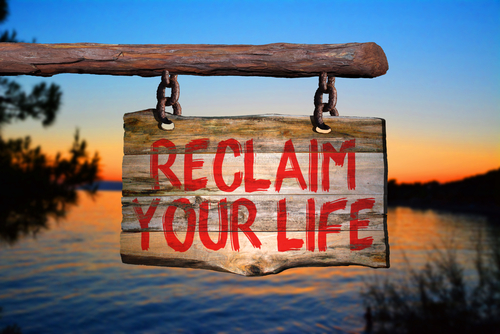 If you really want to change your past, then you have to go back and retrieve whatever piece of you was left behind in that past. In order to become whole now, you have to give yourself what you were missing then.
If you really want to change your past, then you have to go back and retrieve whatever piece of you was left behind in that past. In order to become whole now, you have to give yourself what you were missing then.
You have to reconnect with that lost part of yourself, hold on to it, bring it into the now, and get it up to speed, so to speak. For many people, this is the initial phase of Jungian Analysis. Through dream interpretation, we can not only find those lost pieces of ourselves, but also the inner resources which will revitalize them.
In a sense, actively working with the past means that you have to go back and relive it, but in a way that is not obsessive and destructive, which is the way that most people deal with a traumatic past. Try to see what you learned from your past, what you gained from any traumatic experiences, and how those experiences made you who you are today. Embrace the person you have become, no matter who or what you have become. There is a way to let your past empower you, but only you can realize that. No one else can tell you what it is. Listen to your deeper wisdom. Trust yourself.
And if you need some help letting go, please feel free to contact me.


Comments
Thank you for this article. I don’t know how you did it but you somehow managed to squeeze more insight into this relatively short post than a lot of books i have read about overcoming one’s past. Or maybe it has taken me this long to be ready to hear the message and part with the familiarity, self-rightousness and “comforts” of my victim mentality. Brilliant post! Thanks again
Thank you so much for your comment…I am very happy to hear that it resonated. 🙏
“Our perception is the only place in our lives where we have absolute freedom.”
That is not true. I mean tell that a person who is schizophrenic. If you are Darwinian to any degree, you have to accept the fact, that our perceptions are selected by the degree of truth they represent. If you see a pet in a tiger, you are just dead. So you are not free in this decision.
The goal must be to build a theory/ego, which lets you deal with the cataclysm of life as well as the shiny sides of life. But you are not exactly free in making this theory.
I’ve recently begun Jungian analysis. Sometimes I regret having to work on dreams that refer to my past “stuck” places, as I am older, just retired as a therapist, and want to move FORWARD!
I happened upon your website today and it was serendipitous!
If my dreams are sending me images from my past I suppose I will wrangle again with that.
But perhaps it’s time for me to see it all as a necessary part of my path… some of the “goo”
I can transform to gold.
sorry I missed this. My site did not notify me!